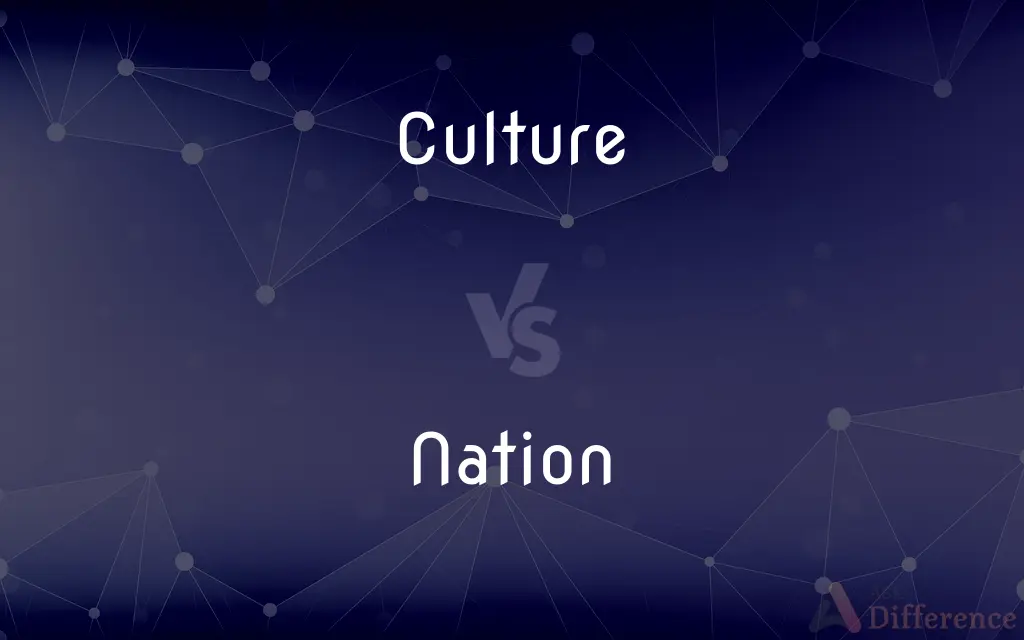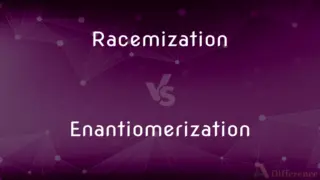Culture vs. Nation — What's the Difference?
By Urooj Arif & Fiza Rafique — Updated on April 3, 2024
Culture encompasses shared values, beliefs, and practices within a group, shaping identities and behaviors. A nation, however, signifies a large group of people unified by common descent, history, or culture, often within defined borders.

Difference Between Culture and Nation
Table of Contents
ADVERTISEMENT
Key Differences
Culture is a complex web of social behaviors, practices, beliefs, and norms that define a group of people. It includes language, religion, cuisine, social habits, music, and arts, which are passed from one generation to the next. On the other hand, a nation is primarily a political and social grouping of people that is often, but not always, connected by the shared sense of identity, history, and possibly a common culture. Nations are more about people's collective identity and the sense of belonging to a larger group with a common history or destiny.
Culture evolves and changes over time, influenced by external factors like technology, migration, and interaction with other cultures. This evolution can lead to a dynamic and diverse set of practices and beliefs within the same community. Whereas, the concept of a nation tends to be more static, defined by historical boundaries, legal systems, and governance structures. Although national identity can evolve, the fundamental definition of a nation as a collective remains relatively constant.
Culture can exist without the formal structure of a nation; it is evident in small communities, tribes, and even in professional or familial settings. It's about shared experiences and mutual understandings that bind people together. In contrast, a nation implies a degree of formal recognition, either by its members or by other nations, and often has defined geographical boundaries. Nations can encompass multiple cultures, especially in diverse and multicultural countries.
The importance of culture lies in its ability to influence personal and collective identity, behavior, and perspectives. It provides a sense of belonging and understanding of the world. Conversely, a nation provides a framework for governance, political identity, and citizenship. It offers a structured system within which multiple cultures and identities can coexist and be governed.
Cultural expressions such as language, art, and traditions serve as a means of communication and preservation of heritage. They are the manifestations of the collective creativity and historical experiences of a community. On the flip side, nations often use symbols like flags, anthems, and monuments to foster unity and national pride among their diverse populations.
ADVERTISEMENT
Comparison Chart
Definition
The set of shared attitudes, values, goals, and practices that characterizes an institution, organization, or group.
A large body of people united by common descent, history, culture, or language, inhabiting a particular state or territory.
Basis
Shared beliefs, practices, and social norms.
Common descent, history, language, or territory.
Scope
Can be specific to small groups, regions, or ethnicities.
Generally encompasses a larger group of people, often within defined territorial borders.
Change and Evolution
Dynamic and subject to change over time due to internal and external influences.
Relatively stable, with changes occurring over longer historical periods.
Representation
Through language, art, rituals, and traditions.
Often symbolized by flags, anthems, and national monuments.
Compare with Definitions
Culture
The complex whole of collective human behaviors that include knowledge, belief, art, morals, law, custom, and any other capabilities acquired by humans as members of society.
The culture of Japan is known for its traditional arts and its contemporary pop culture.
Nation
A large aggregate of people united by common descent, history, culture, or language, inhabiting a particular country or territory.
The Navajo Nation occupies parts of Arizona, Utah, and New Mexico.
Culture
A way of life of a group of people—the behaviors, beliefs, values, and symbols that they accept, generally without thinking about them.
Italian culture places a high emphasis on family and food.
Nation
An imagined community that is both inherently limited and sovereign.
Benedict Anderson described nations as imagined communities.
Culture
The symbols of expression that individuals, groups, and societies use to make sense of daily life and to articulate their values.
Music is a significant part of African American culture.
Nation
A territory or community that is identified by its people's common identity and culture.
The Kurdish nation is spread across several countries in the Middle East.
Culture
The set of shared attitudes, values, goals, and practices that characterizes an institution, organization, or group.
The company's culture is focused on innovation and creativity.
Nation
A collective that shares a common culture, history, and language, which is often, but not always, confined within specific geographical boundaries.
The Basque Nation seeks greater autonomy within Spain and France.
Culture
A social system of meaning and custom that is developed by a group of people to assure its adaptation and survival.
The culture of the nomadic tribes is closely connected to nature.
Nation
A political and geopolitical entity that is represented by a centralized government.
The United Nations recognizes 193 nations.
Culture
Culture () is an umbrella term which encompasses the social behavior and norms found in human societies, as well as the knowledge, beliefs, arts, laws, customs, capabilities, and habits of the individuals in these groups.Humans acquire culture through the learning processes of enculturation and socialization, which is shown by the diversity of cultures across societies. A cultural norm codifies acceptable conduct in society; it serves as a guideline for behavior, dress, language, and demeanor in a situation, which serves as a template for expectations in a social group.
Nation
A nation is a community of people formed on the basis of a common language, history, ethnicity, a common culture and, in many cases, a shared territory. A nation is a collective identity of people.
Culture
The arts, beliefs, customs, institutions, and other products of human work and thought considered as a unit, especially with regard to a particular time or social group
Edwardian culture.
Japanese culture.
Nation
A relatively large group of people organized under a single, usually independent government; a country.
Culture
These arts, beliefs, and other products considered with respect to a particular subject or mode of expression
Musical culture.
Oral culture.
Nation
The territory occupied by such a group of people
All across the nation, people are voting their representatives out.
Culture
The set of predominating attitudes and behavior that characterize a group or organization
A manager who changed the corporate culture.
Nation
The government of a sovereign state.
Culture
Mental refinement and sophisticated taste resulting from the appreciation of the arts and sciences
A woman of great culture.
Nation
A people who share common customs, origins, history, and frequently language; a nationality
"Historically the Ukrainians are an ancient nation which has persisted and survived through terrible calamity" (Robert Conquest).
Culture
Special training and development
Voice culture for singers and actors.
Nation
A federation or tribe, especially one composed of Native Americans.
Culture
The cultivation of soil; tillage
The culture of the soil.
Nation
The territory occupied by such a federation or tribe.
Culture
The breeding or cultivation of animals or plants for food, the improvement of stock, or other purposes.
Nation
A historically constituted, stable community of people, formed based on a common language, territory, economic life, ethnicity and/or psychological make-up manifested in a common culture.
The Roma are a nation without a country.
Culture
The growing of microorganisms, tissue cells, or other living matter in a specially prepared nutrient medium.
Nation
A sovereign state.
Though legally single nations, many states comprise several distinct cultural or ethnic groups.
Culture
Such a growth or colony, as of bacteria.
Nation
An association of students based on its members' birthplace or ethnicity.
Once widespread across Europe in medieval times, nations are now largely restricted to the ancient universities of Sweden and Finland.
Culture
To cultivate (soil or plants).
Nation
(obsolete) A great number; a great deal.
Culture
To grow (microorganisms or other living matter) in a specially prepared nutrient medium.
Nation
(rare) Damnation.
Culture
To use (a substance) as a medium for culture
Culture milk.
Nation
Extremely, very.
Culture
The arts, customs, lifestyles, background, and habits that characterize humankind, or a particular society or nation.
Nation
A part, or division, of the people of the earth, distinguished from the rest by common descent, language, or institutions; a race; a stock.
All nations, and kindreds, and people, and tongues.
Culture
The beliefs, values, behaviour and material objects that constitute a people's way of life.
Nation
The body of inhabitants of a country, united under an independent government of their own.
A nation is the unity of a people.
Praise the power that hath made and preserved us a nation.
Culture
The conventional conducts and ideologies of a community; the system comprising the accepted norms and values of a society.
Nation
Family; lineage.
Culture
(anthropology) Any knowledge passed from one generation to the next, not necessarily with respect to human beings.
Nation
One of the divisions of university students in a classification according to nativity, formerly common in Europe.
Culture
(botany) Cultivation.
Nation
A great number; a great deal; - by way of emphasis; as, a nation of herbs.
Culture
(microbiology) The process of growing a bacterial or other biological entity in an artificial medium.
Nation
A politically organized body of people under a single government;
The state has elected a new president
African nations
Students who had come to the nation's capitol
The country's largest manufacturer
An industrialized land
Culture
The growth thus produced.
I'm headed to the lab to make sure my cell culture hasn't died.
Nation
The people who live in a nation or country;
A statement that sums up the nation's mood
The news was announced to the nation
The whole country worshipped him
Culture
A group of bacteria.
Nation
A federation of tribes (especially native American tribes);
The Shawnee nation
Culture
(cartography) The details on a map that do not represent natural features of the area delineated, such as names and the symbols for towns, roads, meridians, and parallels.
Nation
United States prohibitionist who raided saloons and destroyed bottles of liquor with a hatchet (1846-1911)
Culture
(archaeology) A recurring assemblage of artifacts from a specific time and place that may constitute the material culture remains of a particular past human society.
Culture
(euphemism) Ethnicity, race (and its associated arts, customs, etc.)
Culture
(transitive) to maintain in an environment suitable for growth especially of bacteria cultivate}}
Culture
(transitive) to increase the artistic or scientific interest in something cultivate}}
Culture
The act or practice of cultivating, or of preparing the earth for seed and raising crops by tillage; as, the culture of the soil.
Culture
The act of, or any labor or means employed for, training, disciplining, or refining the moral and intellectual nature of man; as, the culture of the mind.
If vain our toilWe ought to blame the culture, not the soil.
Culture
The state of being cultivated; result of cultivation; physical improvement; enlightenment and discipline acquired by mental and moral training; civilization; refinement in manners and taste.
What the Greeks expressed by their paidei`a, the Romans by their humanitas, we less happily try to express by the more artificial word culture.
The list of all the items of the general life of a people represents that whole which we call its culture.
Culture
The cultivation of bacteria or other organisms (such as fungi or eukaryotic cells from mulitcellular organisms) in artificial media or under artificial conditions.
Culture
Those details of a map, collectively, which do not represent natural features of the area delineated, as names and the symbols for towns, roads, houses, bridges, meridians, and parallels.
Culture
To cultivate; to educate.
They came . . . into places well inhabited and cultured.
Culture
A particular society at a particular time and place;
Early Mayan civilization
Culture
The tastes in art and manners that are favored by a social group
Culture
All the knowledge and values shared by a society
Culture
(biology) the growing of microorganisms in a nutrient medium (such as gelatin or agar);
The culture of cells in a Petri dish
Culture
(bacteriology) the product of cultivating micro-organisms in a nutrient medium
Culture
A highly developed state of perfection; having a flawless or impeccable quality;
They performed with great polish
I admired the exquisite refinement of his prose
Almost an inspiration which gives to all work that finish which is almost art
Culture
The attitudes and behavior that are characteristic of a particular social group or organization;
The developing drug culture
The reason that the agency is doomed to inaction has something to do with the FBI culture
Culture
The raising of plants or animals;
The culture of oysters
Common Curiosities
Can a culture span across nations?
Yes, many cultures spread across national boundaries, shared by people in different countries.
Does culture change over time?
Yes, cultures are dynamic and change in response to various internal and external factors.
How does a nation differ from a country?
A nation refers to a group of people with common identity, while a country refers to a geographical territory with sovereign governance.
Is culture only about arts and music?
No, culture includes a wide range of human activities and symbols, including language, rituals, beliefs, and social norms.
What role does education play in culture and nation?
Education transmits the values, knowledge, and skills of a culture or nation, shaping individual and collective identity.
How is national identity formed?
National identity is formed through shared history, culture, language, and often through the symbols and narratives promoted by the state.
Is language a part of culture or nation?
Language is a crucial element of both culture and nation, serving as a medium of communication and a symbol of identity.
Can a nation's culture change?
Yes, the cultural aspects of a nation can evolve due to influences like migration, global communication, and social changes.
Can a nation exist without a culture?
No, every nation has some form of culture that binds its people together, though it may encompass multiple cultural expressions.
Can someone belong to multiple cultures?
Yes, individuals can identify with and participate in multiple cultures based on their experiences and social connections.
Are all nations sovereign?
While sovereignty is a goal for nations, not all have political sovereignty or international recognition.
How do nations deal with cultural diversity?
Nations adopt various policies, ranging from multiculturalism to assimilation, to manage cultural diversity within their borders.
Can cultural practices be harmful?
Some cultural practices can be harmful or controversial, leading to debates about tradition, human rights, and social change.
Share Your Discovery

Previous Comparison
Racemization vs. Enantiomerization
Next Comparison
Caterpillar vs. WormAuthor Spotlight
Written by
Urooj ArifUrooj is a skilled content writer at Ask Difference, known for her exceptional ability to simplify complex topics into engaging and informative content. With a passion for research and a flair for clear, concise writing, she consistently delivers articles that resonate with our diverse audience.
Co-written by
Fiza RafiqueFiza Rafique is a skilled content writer at AskDifference.com, where she meticulously refines and enhances written pieces. Drawing from her vast editorial expertise, Fiza ensures clarity, accuracy, and precision in every article. Passionate about language, she continually seeks to elevate the quality of content for readers worldwide.














































